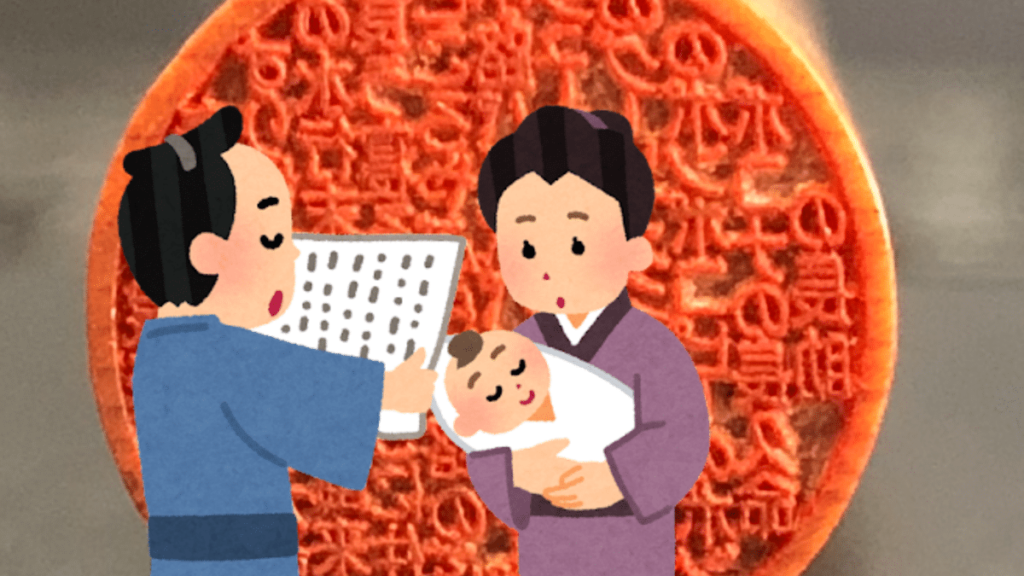[ad_1]
How many middle names would be too much? The US doesn’t place any limits on the number of middle names you can name your kid, but some states have a cap on character numbers.
Middle names are illegal in Japan. But if a Japanese person really wants to give their kid a middle name, there’s a loophole. Japanese children born overseas can come back with middle names. So, one trip to the US at nine months pregnant will do it.
Jugemu’s mom would’ve made the trip.
The legend of Jugemu – now in an inkan!
Jugemu is a fictional child character whose name is so long that rakugo (落語) performers recite it in their opening acts. Technically, Jugemu (寿限無) has 22 middle names.
If this kid were real, they’d have one honkin’ passport.
But one Japanese seal company defies expectations of how many characters can fit into an area smaller than a penny. Nagae-inshou-dō (永江印祥堂) in Shimane Prefecture wanted to prove its distinguished level of craftsmanship. And what better way to do that than neatly sculpting the 108 Japanese characters of Jugemu’s full name within a diameter of 1.2cm seal?
The intricate seal went viral on Twitter originally back in October. The caption read “Jugemu is the longest name in Japan. We can sculpt any name (寿限無は日本で一番長い名前。どんな名前でも彫れます).”
Last Sunday during a long weekend in Japan the company re-posted the Jugemu seal on its Twitter and garnered a lot more attention.

Seals (印鑑; inkan) serve as signatures on official documents in Japan. After crafting seals for more than five decades, Nagae-inshou-dō has tried to revive seals in modern times when seal usage has decreased. While seals are still commonly used, digitalization is gradually taking over in Japan. Japan’s Digital Agency has vowed to replace all physical seals in government documents with digital ones.
Nagae-inshou-dō might have a hard time convincing customers to switch back to carrying around seals for paperwork. But with the capacity to carve up to eighty characters onto a seal’s imprint, the company could change the application of seals. Instead of using seals to sign your name, people could stamp a lengthy joke or rakugo like Jugemu.
Origins
Etymological origins of the name Jugemu are traced back to the word “muryoujukyō (無量寿経)” from Mahāyāna Buddhist texts.
Going further down the rabbit hole, Muryouju (無量寿) is a translation of the Sanskrit word Amitayus which means “a person who has immeasurable longevity” – a reference to Amida, the Buddha of Limitless Light.
The Longest Name

Jugemu’s full name is a mouthful. But here we go.
① Jugemu Jugemu ②Gokō-no-surikire ③ Kaijarisuigyo-no ④ Suigyoumatsu Unraimatsu Fūraimatsu ⑤ Kūnerutokoro-ni-sumu-tokoro ⑥ Yaburakouji-no-yabukouji ⑦ Paipo Paipo Paipo-no-shūrigan Shūrigan-no-gūrintai Gūrintai-no-ponpokopī-no-ponpokonā-no- ⑧chōjumei-no-chōsuke
(寿限無 寿限無 五劫の擦り切れ 海砂利水魚の水行末・雲来末・風来末 喰う寝る処に住む処 藪ら柑子の藪柑子 パイポ・パイポ・パイポのシューリンガン シューリンガンのグーリンダイ グーリンダイのポンポコピーのポンポコナーの長久命の長助)
Let’s break it down and make it digestible.
① Jugemu (寿限無)
It means to have a long life, which any parent would wish for their kids.
② Gokō-no-surikire (五劫の擦り切れ)
Kō (劫) is a unit of time used in Buddhism and Indian philosophy which signifies a cosmically long period of 4.32 billion years. In Japan, one kō is described as how long it would take for the brushes of an angel’s robe to shave away a rock the size of Mt. Fuji. Gokō-no-surikire is one kō multiplied by five. Jugemu is hoped to live as long as it takes to shave away five Mt. Fujis with a garment sweeping over it.
③ Kaijarisuigyo-no (海砂利水魚の)
It means the innumerable fish in the sea which is referencing again to the child’s longevity.
④ Suigyoumatsu Unraimatsu Fūraimatsu (水行末・雲来末・風来末)
It means the flow of water, clouds, and wind which is referencing the child’s broad future.
⑤ Kūnerutokoro-ni-sumu-tokoro (喰う寝る処に住む処)
It means food and shelter which are the daily essentials for the child’s future.
⑥ Yaburakouji-no-yabukouji (藪ら柑子の藪柑子)
This is the name for an evergreen (yabukouji) that grows red fruit in the winter which is used in New Year’s festivities as a plant that brings good fortune to a child’s future.
⑦ Paipo Paipo Paipo-no-shūrigan Shūrigan-no-gūrintai Gūrintai-no-ponpokopī-no-ponpokonā-no (パイポ・パイポ・パイポのシューリンガン シューリンガンのグーリンダイ グーリンダイのポンポコピーのポンポコナーの)
In the fictional universe of Jugemu, there was a kingdom called Paipo in ancient China. The kingdom of Paipo had a king named Shūrigan and queen named Gūrintai. Their children were Ponpokopī and Ponpokonā who both lived long lives.
⑧chōkyuumei-no-chōsuke (長久命の長助)
Chōkyuumei means long life.
The Rakugo Connection
You need to perform short skits as a zenza (前座) if you want to make it into the world of Japanese rakugo, a traditional equivalent of standup comedy (albeit rakugo is performed sitting).
After securing a rakugo master under which you are granted an apprenticeship, you are expected to perform various tasks as a zenza. Small chores from your master, cleaning the theater, and warming up the crowd (free of charge) are included in the job description.
One of the acts that is a popular choice for zenza is Jugemu.
What to read next
These Japanese Product Names Are Just Bad Dad Jokes
Sources
[1] US Naming Laws by State. US Birth Certificates
[2] ミドルネームの意味とは?【具体的な表記や名前の一覧も紹介】. LingoTimes
[3] 108字ぎっしり、熟練職人の技…「寿限無」押せる印鑑、松江の印鑑店が製作. 読売新聞
[4] 会社概要. 永江印祥堂
[5] 寿限無 寿限無意味・語源・由来. worldfolksong.com
[6] Amida, the Buddha of Limitless Light. THE MET
[7] 落語家の階級. 公益社団法人落語芸術協会
[ad_2]
Source link

